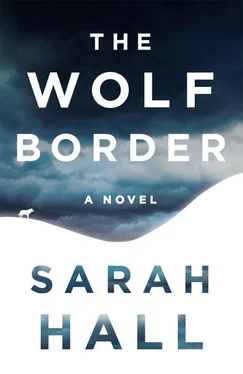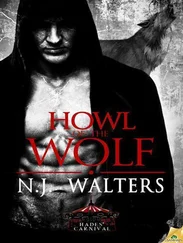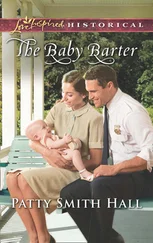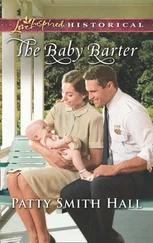They stay in one of the hides that Gregor has been using, which is cold overnight, and damp, smells of utility and the chocolatey rusk of power bars. It is a thrill to be back out, to see the juveniles first-hand, gaining courage and endurance. They maul and tumble and ambush each other, more playful than dogs. The littlest male shows no signs of deficiency; he jumps on his father’s back, harasses Ra until Ra stands over him demanding submission. Rachel feels peculiarly light, misses the smell and weight of Charlie, the sense of him close by. But this too is second nature; she has missed seeing wolves, missed waiting to see them. During the night their human presence in the enclosure sets off a volley of howling. She and Huib lie side by side and unmoving in their sleeping bags, like vegetables, making notes.
When she arrives home, it feels as if she has been in exile for a decade; she allows herself the indulgence of exaggeration, she is partially qualified: unwashed, weary, hungry. And she is rewarded. The immediate recognition and delight on Charlie’s face is intoxicating, he leans steeply out of Lawrence’s arms, towards her. Mamamama. She gathers him in and he clings on, his strong, monkey-ish arms throttling her.
Had a good time? she asks her brother.
He is smiling and looks pleased with himself — nothing untoward has occurred, no midnight meltdowns, tumbles, or other accidents. A victory.
Great. How about you? Good to get out there again, I bet?
It was wonderful. Am I allowed to say that?
Of course you are. Hey, wild woman, you’ve got something in your hair.
He brushes out the attached item.
Want some tea?
Oh God. Yes please! So much for doing without field comforts. Is there hot water? We want a bath!
She kisses her son on his hot fragrant neck.
Loads. How’s the pack doing?
Oh, brilliantly.
It’s true. There is no real danger to the litter. Not even the buzzards would have attempted a raid when the pups were smaller. The golden eagles, burly enough to have managed a steal, are long gone from the county. Regardless, Ra and Merle have created a protectorate, moving the pups from the natal den to a rendezvous site. They are closely watched and fed with regurgitated meat. They follow their parents, trotting alongside, noses up-tilted, at heel, keen little followers. They are brought to carcasses, allowed to tug at the ribcage of a deer. They make their own way back while their parents scout, sometimes roaming too far. Ra arrives hastily in response to any distress call, escorting the lost pup home. Soon they will be taught to hunt properly, beginning with the madcap chase of a brown hare. None of the pups land it, but their father does. At the ungodly screams of the kill, all four retreat over the brow of a hill. Ra carries it back to them, a shaggy, amber-eyed pelt, swinging between his teeth. Edible. Fresh. Ever after the association is made.
*
Lena dies soon after. The funeral service is very well attended, by the estate staff, family, and an older, rustic set, extending up through the borders — Michael’s associates, those who worked the previous century’s agricultural landscape, attending horse shows, common ridings, hunts. Rachel also attends with Charlie and Lawrence; it seems the right thing to do. The service is held in the old Annerdale church near the lake, accessible only by unmade track, so the guests must park along the roadside and walk in a long, dark, realist procession to the grounds. Thomas and Barnaby greet the mourners, handing out service sheets and printed copies of the eulogy. Saint Mary’s is newly roofed and the cemetery is neat. Inside, oak polished to a dense shine, urns of cut flowers, soft organ music, and stiff black hats. It is perhaps inappropriate to bring the baby, but Rachel feels she cannot put in an appearance without him, given Michael’s fondness. Binny never protected her from such things when she was growing up; she was made to face death, to understand its common occurrence. They find a pew towards the back, try to keep Charlie entertained and quiet.
The body is brought in via traditional horse and carriage over the lake road, two squat fell ponies straining against the harness, the leather creaking, their tack tinkling. The coffin is wicker, covered with floral cuttings. Six men, including the Earl and Barnaby, shoulder it off the trap and walk it to the altar of the church, where it is set on a stand. Rachel is reminded of her childhood — the processions, gates locked at weddings until coins were flung, first-footing, harvests, and carlin suppers. There was no nostalgic irony in any of it; it was simply current practice. Michael does not greet or speak during the service, but leans fatally on the front of his pew. The music plays out and the bishop prepares to conduct the ceremony. Rachel turns to Lawrence, and says, finally,
I’m sorry about missing Mum’s funeral. I should have come.
Lawrence smiles sadly and shakes his head.
Don’t worry. These things happen. Besides, it wasn’t like this. I don’t remember much of it anyway.
She wonders if he was using then. The bishop drones through the rituals. Barnaby takes the lectern and talks about his mother’s endurance and loyalty, her love of the western valleys where she was born and lived out her life — her maiden name, Prowle, a signature of belonging, her people old-settlers, harbour masters. He thanks the Earl for the years of service, as one might thank an institution, or presiding deity. Rachel is surprised to see Leo, standing next to Sylvia in the front row, dressed this time in a black suit and tie, tidy, composed, behaving with dignity. She thinks again of the suited, wolf-headed man at the early protests. It was not him, she is sure, nor would he have cut the enclosure wire.
The hymns are sung at moderate volume. ‘Abide with Me’. ‘Lord of All Hopefulness’. There are no modern twists, no pop songs. Charlie begins to get restless in her arms, he wants down, to try his new stepping skills, wants to be hung touching the ground so he can walk with a stabiliser. She moves into the side aisle with him, holds his arms while he pigeon-steps on the flagstones. She looks at the plaques on the outer wall, the name Pennington repeated over and over, war memorials and honours. The smell all around is of stone kept fractionally damp by the seasons of rain, though outside it is warm; the second half of summer has dried the earth.
Then, suddenly, Michael does speak. Midway through the bishop’s address, he releases his grip, and walks from the pew, forward to the front steps. The bishop steps to the side. My wife, Michael says, as if claiming her back. My wife . There’s a pause. Then he gives a short, bitter tirade against a God who would dole out such punishment to the undeserving. Such suffering, a plastic cunt, her bags of shit. The congregation winces and looks away, but no one intervenes, the embarrassment must be borne. His face is a mask of disgust. Whatever symmetry he found during Lena’s illness has been abandoned. There’s the sound of female crying from the front pews — Lena’s sister, perhaps. It is all horrible to watch and hear, but surely he is entitled, Rachel thinks. She almost admires it. Lawrence glances over, makes a jerking movement with his head — does she want him to take Charlie outside? But Charlie can’t understand. He leans backward in her grip and looks up at the painted bosses in the roof of the church. She shakes her head. Michael stands silently facing the congregation, and is led away by Barnaby, down the aisle and out of the church. He looks old. She sees him take a hip flask from his inside pocket as he passes. The bishop resumes, says such anger is understandable, we are all tested, we are all profoundly hurt by such seemingly senseless loss, but his starched cassock and talk of afterlife seem faintly ridiculous after the authenticity of the bereaved husband.
Читать дальше












